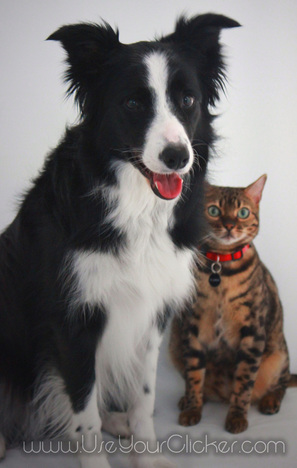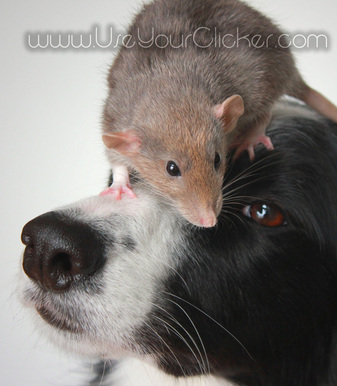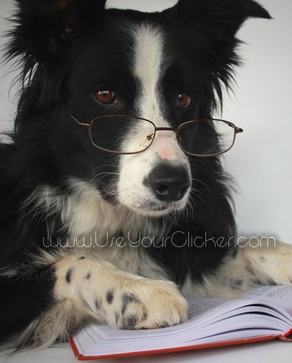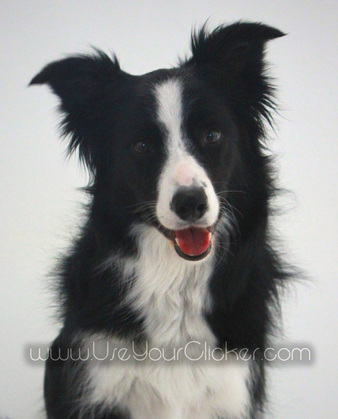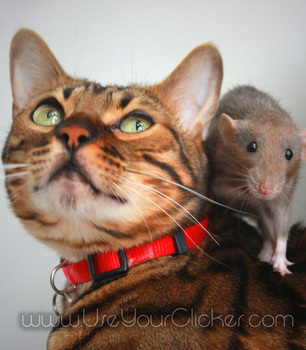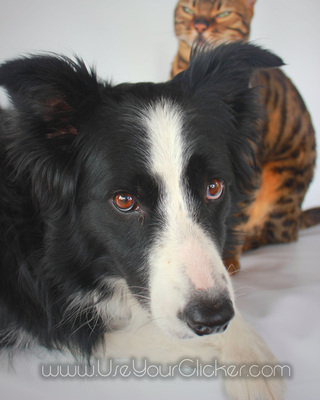Questions and Answers
Below are amongst the most popular questions asked about my website, videos, or training.
If you have a question, please read through the ones listed below first before submitting it.
If you have a question, please read through the ones listed below first before submitting it.
|
Q: How can I make my own clicker if I can't buy one?
A: There are many alternatives to using commercial clickers. Simply find something that can produce a quick, preferably sharp noise that sounds exactly the same each time the noise is made. Anything as simple as a pen clicking, a jar lid, a clicking noise made with your tongue, or even the snap of your fingers can serve as a marker. Q: Is clicker training absolutely necessary, or can a dog learn tricks without a clicker? A: There is a difference between using "the method of clicker training" and "using a clicker to teach tricks". Clicker training means that you only reward the dog for doing things right rather than correcting him for doing things wrong (positive reinforcement) and use a clicker or other marker to mark behaviours. You can read my clicker training page for more information on how it works: http://www.useyourclicker.com/clicker-training.html That said, a clicker is not absolutely necessary to teach a dog tricks. You can use a short word such as "Yes" or "Good" to mark behaviours, or you can use one of the alternatives listed in the above answer. Q: If I was to try to teach my dog something and he does half of it right but the other half wrong, do I still give him a reward? A: Yes, absolutely! When learning a new trick, dogs will not perform the complete behaviour right away. You need to teach them in small steps, and gradually raise the criteria as the dog succeeds. Once he understands what you are teaching him, you can begin to wait for him to offer more before rewarding him (e.g. - add duration, distance, speed, etc.) You can read our Clicker Training page for more tips. Q: Do clicker trained dogs rely on the 'click' to perform a good behaviour or what you ask of them? What if you forget to take your clicker with you while you are out and about with your dog and want him, for example, to sit and wait before crossing the road. Do they always need the clicker to ensure they will do it?
A: This is the most common misconception people have with clicker training. I have heard of many people who refuse to use this incredible training method because they believe this. A clicker is merely a marker when training, not a reward. It is a tool that is used to capture behaviours the dog is doing and communicates to him that it was good, and that a reward is to follow. This increases the likelihood of the behaviour being repeated. When the dog understands the behaviour you have marked and continues to offer it, it is put on cue, and once the dog masters the trick, the clicker is no longer needed to capture or "mark" the behaviour. The 'click' is not a reward; it just tells the dog that a reward is coming. If the dog already knows how to "sit", you do not need a clicker to mark the behaviour, and the dog will sit regardless of whether the clicker is with you or not. I do not bring a clicker with me when I take my animals places, and they are always reliable with their training. To find out more about how clicker training works, read our Clicker Training page. Q: When will your DVD be available?
A: I am not certain at the moment, but updates will be published on my website and blog as soon as I have any information. I have finished taking trick requests now as I believe I have enough for the DVD. Q: When teaching a dog a trick, at what stage do you add the verbal cue? A: When the dog is consistently offering the behaviour and you have no doubt in you mind that he will do it, you can then introduce the verbal cue. Q: What country do you live in? A: I am Canadian. Q: Will your DVD be available in Europe? A: I am still working through all the bugs and details concerning availability of the DVD once complete, but I will do my best to cater to as many locations/countries as possible. Q: There is a "Nana Border Collie" on Facebook. Is that you? A: No, it isn't. Nana's official Facebook page is titled "Amazing Animal Tricks" and is shared with Kaiser the Bengal and my mischief of talented rats. Any other Facebook page with my animals' photos is a fake! For more information, please visit our impersonation page. Q: How often do you train your animals? A: If you are referring to specifically teaching tricks and behaviours, I work with each one of my animals daily as they thrive on learning tricks and exercising their minds. Although, technically, every moment I spend interacting with my animals I am "training" them, since they are constantly learning things from me on their own through observation. |
Q: What camera/lenses do you use?
A: My older videos were all filmed with the Canon EOS Rebel T2i and the Kodak EasyShare Z1285, with the slow-motion shots having been filmed with the Sony HandyCam HDR-XR550V. I use my Canon 7D to shoot all of my current videos using my 17-40mm lens (I use this for photography as well), and the slow-motion shots are filmed with my GoPro Hero 3+ Black Edition. Q: What video editing software do you use? A: My older videos were put together using MAGIX Movie Edit Pro 16 Plus. I do all of my current editing using Sony Vegas version 12. Q: How did you learn how to train animals? A: I am almost 100% self-taught, and learned by observing and studying animals' behaviour and by trying different things and sticking with what worked. I am always learning. Q: Do you offer any training courses? A: No, however there will be Dog Trick Tutorial DVDs available on the "Store" page of our site in the future. Q: What kind of treats work best for dog training? A: It all depends on the individual dog. With some dogs, cooked chicken may work best, where with others, cheese does the trick. Find whatever food your dog enjoys the most and use that as a reinforcement. Q: How did you first find out about clicker training? A: I had read about clicker training in a book years back, and decided to give it a try. Q: What got you interested in buying a Border Collie? A: Being an active person, I was looking specifically for an active, athletic, and intelligent breed to suit me and my lifestyle, and became interested in the Border Collie. It is this same reason I got a Bengal cat, which is also a high-energy breed. Q: Do you use the clicker only when teaching new tricks or do you use it when reviewing old tricks, too?
A: The clicker serves as a marker when training, meaning that whatever the dog is doing at the exact moment the sound is made, is correct. When reviewing old tricks the dog already knows the behaviour, so there is no need to continue to mark it. Q: What do I do if my dog will react to hand signals but not to verbal cues? A: You can work on teaching your dog the meaning of verbal cues. Start by asking your dog to do a trick using the hand signal, then say the cue as the dog is performing the behaviour. Click and reward the dog extravagantly with praise and a treat, then repeat several times. Eventually, simply say the verbal cue and wait for the dog to think on his own as to what to do. If he doesn't understand at first, you may want to remind him with the hand signal. The dog should begin to associate the cue with the hand signal, which he already associates with the behaviour. It shouldn't be long before the dog will perform the trick exclusively with the verbal cue. Q: Is the old saying "You can't teach an old dog new tricks" true?
A: Not at all! Any animal of any age can begin learning tricks with positive reinforcement. Depending on the individual, I find that older animals are often easier to teach than younger ones, since they are usally more focused and have longer attention spans than youngsters. Q: If I must not punish my dog when he does something wrong, how can I teach him not to do it? A: Your first step will be to discover why the dog is doing the undesired behaviour. Punishing the animal will not fix the problem; it will only make it worse, as it will confuse him and damage the relationship between you and the dog. First ask yourself, "Why is my dog doing this?" Dogs never "just do things". There is always a reason for it, and it is our job as their teachers to discover what it is so we can help them. Once you discover the answer, you can begin working together on a solution with positive reinforcement. Dogs learn by being taught what to do, rather than what not to do. With every undesired behaviour you wish to work with your dog on, there must be an alternate behaviour for him instead. You will teach the dog the desired behaviour (alternative), and reward him when he does it instead of the undesired behaviour. If your dog does the unwanted behaviour, do not punish him. Instead, remind him of the alternate behaviour. Above all, it is very important that you always set your dog up for success. Remove any temptations that would encourage your dog to do the unwanted behaviour, and if you see him about to do it, redirect his attention and have him do the desired behaviour before he does the unwanted behaviour, then reward him with plenty of praise and treats. Dogs are very intelligent. Behaviours that they get rewarded for will be repeated, and those that are not reinforced will cease. Be very patient with your dog at all times. If the reason for your dog doing the undesired behaviour is due to fear, you can read our Clicker Training page under "Keep Training Paw-sitive!" for more information about helping him overcome this with counter-conditioning. Q: Who is Nana and Kaiser's trainer and what is her background?
A: That would be me. I am considering creating a page on this site with background information about myself as an animal trainer due to the many questions I get asked. Q: There are appearances of birds in some of your videos. Are they yours? A: No, they aren't mine. My only animals are listed on this website under "The Gang". Q: Will you officially open a Facebook page for Nana's fans? A: Due to impersonators, I have been forced to do so. Please read my blog post for all the details: http://nanabordercollie.blogspot.com/2013/11/facebook-update.html |
